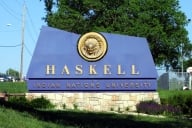You have /5 articles left.
Sign up for a free account or log in.
Do historically black colleges and universities need to get serious about online education?
Perhaps, says the latest report from the Digital Learning Lab at Howard University. An increasing number of historically black institutions are wading into the online medium — often with the help of for-profit developers. Still, the vast majority of HBCUs do not offer online programs.
“At this point declining student enrollments pose an existential challenge" for many black colleges, and that should attract more interest in online education, writes Roy Beasley, founder and director of the lab, in the new report.
“In their search for ways to increase their enrollments,” Beasley writes, “the private HBCUs that hitherto have shown little or no interest in meeting the continuing education needs of non-traditional African American students are now giving serious consideration to online programs, not only as a potential source of sorely needed additional revenue, but also as a source of additional enrollments that would help them justify their continued existence.”
Still, the growth in the number of private HBCUs that offer online programs — from two to six since 2006 — has been modest. And the overall proportion of historically black institutions offering online degree programs (defined as having 80 percent or more of the coursework of at least one academic program delivered online) remains low. Of the nation’s 105 HBCUs, only 19 offer online degrees — 18 percent. (Of the 40 public HBCUs, 13 have at least one online program, up from 10 in 2006.) The national average across all institutions is just over 30 percent, according to Jeff Seaman, director of the Babson Survey Research Group.
Both Seaman and Beasley point out that this disparity probably has nothing to do with any inherent aversion to online education at HBCUs and everything to do with the fact that HBCUs are generally small, and that smaller institutions — whether public or private, historically black or not — generally have fewer resources to develop and administer online programs alongside their face-to-face ones. (Indeed, even many black colleges function with relatively small budgets and serve significant populations of low-income students in need of generous financial aid.) Compared to other institutions of that size, 18 percent with online programs is “a reasonable number,” says Seaman.
Yet this may offer cold comfort to HBCUs trying to “justify their continued existence” (in Beasley's words) at a time when online offerings are seen as key to growth — especially given the success for-profit juggernauts such as University of Phoenix and DeVry University have had recruiting black students to their online programs. Beasley notes the “dramatic upsurge of interest in HBCUs and other nonprofit institutions who now regard online programs as providing cost-effective options that can help them close their tuition/total cost gaps and, perhaps, provide a profitable source of additional revenue.”
Consistent with general data from the Sloan Consortium, Beasley’s study found that among HBCUs, the institutions with lower graduation rates were more likely to be interested in creating online programs. The new study also found that 70 percent of those HBCUs that have managed to add online degree programs have done so in the same way as have other small institutions that see online as strategically important: by outsourcing to for-profit facilitators such as Embanet-Compass and EOServ Corp. The emergence of such companies as options for outsourced program development and administration has been “game-changing” for HBCUs that might have otherwise struggled to build online programs on their own, Beasley writes.
However, while he acknowledges the temptation created by the “widely publicized, recession-resistant earnings of the most successful for-profit operations” (and admits that he himself has been put in charge of developing online degree and certificate programs at Howard that aim to be “substantial revenue generators”), Beasley cautioned against viewing online education as a cure-all.
“Today’s blogosphere and other media are clogged with super-hype that boldly asserts that online programs will magically solve all of our problems,” he writes in his conclusion. “Unfortunately, this kind of ‘irrational exuberance’ invariably leads to investment bubbles. Given the pressing, un-magical reality of our problems, the last thing the HBCU community needs is an ‘online bubble.’ ”
For the latest technology news and opinion from Inside Higher Ed, follow @IHEtech on Twitter.








